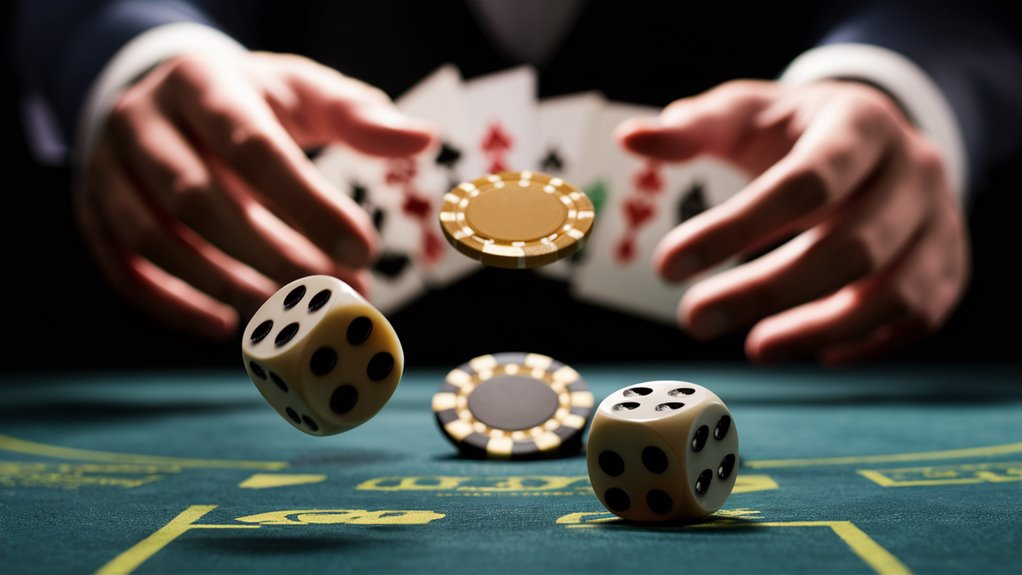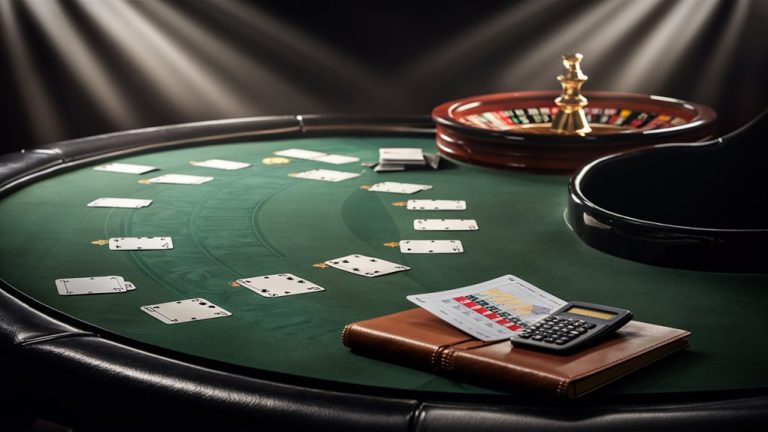
Is Gambling Skill or Technique? The Real Answer
One must judge where skill and chance lie in gambling on a scale of subtlety, rather than force them into simple pigeonholes. What scientific research and statistics bear out is that different gambling games need different combinations of technique and random chance.
Why Do Games of Chance Do Better Than Those Requiring Skill?
Casino games are near pure chance, such as slots and roulette, where Return to Player (RTP) percentages range from 85-98%. In contrast, poker or sports betting incorporates considerable skill elements to one degree or another, and skilled players consistently keep winning over long periods of time.
The Contributing Skill Elements
Research shows that the success of poker is approximately 60 percent talent, 40 percent fortune. That 60% garnered from skill means:
- Figuring out mathematical possibilities
- Reading opponents psychologically
- Strategic choice-making
- Managing your bankroll
- Learning the patterns of your opponent’s moves
Skill Games vs Random Chance
When played using perfect basic strategy, Blackjack can drive the house edge down to less than 1%. This shows how skill can truly move gambling. Players who specialize in strategic gaming beat even those based on chance through:
- Detailed statistical analysis
- Complex implementation of strategy
- Careful management of risk
- Exhaustive knowledge about their games
- Thinking ahead
Ultimately, the potential for success in gambling largely turns on the kind of game you choose and how you play it. Whereas chance is still an unchangeable part of life, some forms of betting demand long hours of dedicated study to be mastered and practiced more profitably than others.
What is Skill and What is Fortune?
In Gambling What is Skill and what is Luck?
Core Varieties of Skill
Skill is an acquired talent which becomingly players can systematically develop, practice and improve with hard work and experience. Luck, on the other hand, is quite different; it is the arbitrary or unforeseen event which are completely beyond human control and behave in a way unpredictable over time. These two fundamental differences determine what we have gambled on.
Identifying Skill Factors Among Them
- Math tricks might not seem at first to be part of the casino world, but anything where you make careful calculations and then bet on them is definitely part of a gambler’s repertoire.
- Gambler pattern recognition skills
- Psychological reading about opponents
- Maneuver disposition-making processes
- Capital management
Measuring Performance Standards
Gambling with skills is embodied in a few ways that:
- Upshots remain consistently good over months, years or decades
- Improvement in performance can be seen as training goes on from one level to the next
- What you achieve stands out from what everyone else achieves
- People without a lot of gambling experience have no easy way to take themselves out into a position deliberately
The Spectrum of Skill and Luck
Most forms of gambling involve different levels of skill and chance. Poker, the king of all complex games, can be a prime example:
- Assessing with strategy this or that possibility
- Tactics of psychological manipulation
- Controlled management of the funds
- Elementary, sometimes nearly flat, aspects for card distribution
The Practical Test
A definitive method of identifying the practice or chance nature of gambling rests on:
- Ability to deliberately squander money means skill
- Not capable of influencing outcomes on a consistent basis suggests luck prevails
- Performance variance is constant through time
- Practice matches improvement almost perfect
This comprehensive framework offers a precise evaluation of the genuine skill versus luck aspects in different forms of gambling.
Science of Gambling
The Science of Gambling: Brain Mechanisms and Psychology
Neurological Basis of Gambling Behavior
Gambling behavior is influenced by the brain’s reward system, which operates similarly to other addictive behaviors, altering its dopamine release patterns Pairing Fiery House Scenes With Soft, Luxurious Gains as well. This makes gambling common not just in North America and other developed countries but also in regions such as East Asia rich with resources that provide an escape from poverty or repression to some extent for their people.
It is established from research on show tickets vs winning streaks to decide which half of the house will win that simply anticipating potential pay-offs has a significant neurological effect, even when no actual winning takes place. The activation of this reward circuit in the brain by stimulation surrounding expected future events accounts for why gambling and slot machines remain popular even with chronic losers.
Cognitive Processing and Decision-Making
Acquiring large amounts of money can make a person feel as though they should keep going even if they have already lost everything. Of more immediate concern are near-misses, which flip psychological switches in the brain in ways not unlike an actual jackpot.
The prefrontal cortex, prime outpost for executive function and self-control, displays significant alterations under the influence of strain such relationships tend to have on a person. Gamblers will often lose their powers of decision-making fine and strategic thinking given this physical impact by directly affecting someone’s ability to play rationally.
Statistical Understanding and the Tell-Tale Brain
Research shows that the brain has reliable patterns for processing gambling outcomes. Gambler’s fallacy is a principal cognitive bias, where subjects project predictable patterns onto random events.
Statistical analysis shows that this misconception of probability applies to every gambling format, whether it’s skill-based or relies on chance. The logical fallacy and these natural cognitive biases plus sophisticated game design mean that there exist game layers which transcend traditional skill versus luck lines.
Popular Games and Elements
Popular Game Categories: Knitting One’s Understanding of Game Elements and Characteristics
Games of Pure Luck
In games of pure chance such as slot machines or roulette betting, the events of each coming roll are determined purely by a mechanical system. These games carry a guaranteed return percentage between 85-98% set before you start playing and then determined entirely from a random number generator.
Players are dealing with fixed-odds systems wherein skill need take no part at all of determining whether or not they win.
Strategic Card Games
Poker and blackjack games of chance represent sophisticated gaming experiences where the element of skill heavily sways what unfolds. In poker, strategic decision-making accounts for about 60 percent in all one’s long-term success, while fate elements have a 40 percentage role.
Blackjack players who have mastered strategy can achieve some truly splendid results by reducing the house edge to below 1% through optimal play.
Sports Betting and Critical Factors
Sports betting and daily fantasy sports calls for comprehensive analysis. Successful participants are people who make detailed statistical analysis, team and single-player evaluations, and who know when to best enter strategic markets in order to make a profit.
Studies have shown that approximately 3% of the sports bettors who are able to keep up their winning streak over time achieve profitability through gained expertise and methods of system.
Evolution of Hybrid Gaming
The valley before the current day gaming platform manufactures brings on diverse hybrid experiences: skill-based bonus features grafted onto chance-based intestinal tracts.
Video slot betting and social casino games companies represent the contemporary dramatic changes of this type. These hybrids combine luck, strategy, and leisure time. Therefore, they are at the leading edge in gaming design; they offer both entertainment for the masses and depth.
The link between mechanics in a game and the engagement of a player. Newer gaming platforms use highly-developed reward systems and engagement mechanics to produce an irresistible player experience. Game design involves the careful balancing Cooling off Quick Tics With Icy Splitting Finesse of risk/reward odds while adding chance and skill factors so that players with different levels of skill can all retain interest.

Professional Gambling Success Stories
Gambling Success Stories of World-Class Professionals: Tactics
In Gambling, Skill Brings Success
Professional gamblers have achieved outstanding results through well-disciplined tactics and honing skills to a superb edge. Celebrities like Phil Ivey and Daniel Negreanu have earned millions of dollars through poker. This demonstrates that sustained victory means more than simply counting on good fortune.
These master players combine mathematical probability, psychological analysis, and systematic risk management techniques to generate a steady income stream.
Analysis and Bankroll Management
Professional sports bettors such as Billy Walters show consistent returns from sophisticated computing models and stringent bankroll discipline. Only a fraction of one percent of gamblers reach professional status, but successful players all have a number of things in common: They regard their game as a business, maintain detailed records of their results, and use expected value calculations to make every decision they can.
Risk Management and Winning Ratios
Elite gambling professionals maintain a consistent approach despite the inescapable truth that each game must see its own twists. Statistical data has shown that professional sports bettors take in 53-55% wins; in a game of poker, successful players will have 60% winning times. These discreet edges, carried forth to high-volume scenarios with Drifting Serene Scenes Into Pot-Sundering Force proper bankroll management, make overall profits worthy of mention for the future.
Own Key To Success
- Investigating probability mathematically
- The psychological tactics of victory
- Bankroll limits measurements
- Processing performance data rigorously
- Limiting risks on grounds of profit return
Professional Gambling Success is generally obtained by mastering these elements in combination with a disciplined execution process that continues to improve your skills. The most successful players use technology to their advantage and have a knowledge of analytics and systems.
Role of Psychology plays in Gambling
The Psychology of Gambling Behavior
Cognitive Mechanisms and Decision-Making
The psychological dynamics which impel gambling far exceed mathematical strategy, incorporating significant cognitive biases which shape voting decisions.
Illusion of control and the gambler’s fallacy added together contribute to how players assess probabilities risk; they often lead players into gross overestimation predictions about gambling results.
Neurological Rewards and Addiction Patterns
Dopamine release during gambling activities creates similar reward patterns to substance addiction, setting up powerful neural pathways that reinforce betting behavior.
The near-miss effect triggers neurological responses almost identical to winning, perpetuating continued play in spite of losses.
These psychological mechanisms form addiction and compulsive betting patterns.
Impact of Mental Fatigue on Gambling Decisions
Decision fatigue emerges as a key factor in gambling outcomes, particularly after prolonged sessions. Long play periods lead to:
- Declining judgment abilities
- Increased risk-taking behavior
- Interference with decision-making processes
- Reduced impulse control
Professional Gambling Psychology
Successful long-term gamblers consistently demonstrate:
- Strong emotional regulation
- Advanced metacognitive awareness
- Recognition of psychological influences
- Strategic antidotes to cognitive biases
Strategic Psychological Theories
Profitable gambling demands getting robust strategies to counter built-in cognitive prejudice control, coupled with strict control over emotions. 먹튀검증업체 순위 The combination of mastery over psychology and strategic thinking divides successful players from the consistently losing ones.
Legal and Regulatory Considerations
Legal and Regulatory Framework for Gambling
Regulations gambling
Gambling regulations vary widely across all international jurisdictions; they create a complex regulatory system which oversees industry operations.
The basic divide within such regulation is between skill-based gaming and chance-based gambling, a critical factor in how different activities are seen by law.
U.S. Regulatory Environment
Online gaming: Other states, however, put strict limits on gambling.
The advent of online gambling platforms means regulators are now having to figure out how to enforce former rules in the digital age.
Activity Classification & Legal Status
The regulatory classification of gambling activities has a large impact on whether they are legal. This complexity is seen in poker regulation, where some jurisdictions consider it skill-based activity and others chance-based.
In 2018, a Supreme Court decision on sports betting changed the game entirely. It allowed individual states to set their own rules for gambling on sports.
International Standardization Attempts
The European Union leads the quest for uniform regulations and member states are or work together on shared frameworks for gaming.
This trend toward harmonized regulations strikes a balance between the need for consistent standards and recognition of national jurisdiction over gambling matters.
These developments reflect the move towards a new approach to governing gambling in the digital era.
Critical Regulatory Considerations
- On-line gambling operations, integrating territory boundaries
- Digital compliance obligations
- Player protection standards
- Anti-money laundering behavior
- Responsible gaming measures






